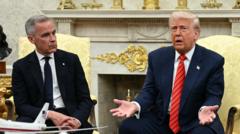Did Canada's Carney Surrender to Trump on the Tech Tax?

Understanding the Rescission of Canada’s Digital Services Tax: A High-Stakes Diplomatic Move
In a dramatic turn of events, Canadian Prime Minister Mark Carney has decided to rescind the controversial Digital Services Tax (DST) aimed at large U.S. technology firms. This decision, reportedly made under pressure from President Donald Trump, is a significant development in the ongoing trade tensions between the two neighboring countries. The implications of this move stretch far beyond immediate financial concerns, touching on the broader dynamics of international trade, taxation policy, and diplomatic relations. In this article, we will explore the nuances of this situation, the reactions it has garnered, and the potential consequences for both Canada and the U.S.
The Digital Services Tax: What Was It All About?
The Canadian Digital Services Tax was introduced with the intent to level the playing field for local businesses by imposing a 3% charge on revenues generated by large tech firms from Canadian users, specifically when those revenues exceeded CAD 20 million. This tax was designed to target major U.S. tech giants like Amazon, Meta, Google, and Apple, which have significant revenue streams from the Canadian market but have historically paid minimal taxes due to their business structures. The DST was anticipated to yield CAD 5.9 billion over the next five years, with projections estimating that it would cost tech companies over CAD 2 billion in its first year alone, retroactively applied from January 2022.
The Political Landscape: Pressure from the U.S.
Upon returning to office, President Trump quickly expressed his discontent with the Canadian tax, labeling it a "blatant attack" on U.S. interests. The timing of his criticism coincided with ongoing trade negotiations, which were already fraught with tension. Trump's administration took a hard stance, threatening to withdraw from these negotiations and raise tariffs on Canadian goods in retaliation.
In a rapid response to the escalating situation, Canada announced on a Sunday that it would halt the collection of the tax payments and introduce legislation to abolish the tax altogether. This move was confirmed by Canada's finance minister, François-Philippe Champagne, who emphasized that Canada's preference had always been a multilateral agreement on digital services taxation. However, the decision was perceived as a significant concession to U.S. pressure.
Reactions from Canadian Leadership
The decision to rescind the tax has sparked a variety of reactions within Canada. While some view it as a necessary diplomatic maneuver, others, including opposition leader Pierre Poilievre, criticized the timing and the perceived capitulation. Poilievre remarked that Carney had "put his elbows down" – a phrase that references a campaign ethos centered on defending Canadian interests against U.S. pressure.
The opposition leader urged the Prime Minister to leverage this concession to negotiate the immediate rescission of U.S. softwood lumber tariffs, suggesting that Canada should extract tangible benefits for its workers from this diplomatic exchange. The sentiment reflects a broader concern about maintaining Canadian sovereignty and economic interests in the face of aggressive U.S. trade policies.
The Broader Implications for International Trade
The rescission of the Digital Services Tax raises significant questions about the future of international taxation, particularly for multinational tech firms. As more countries adopt similar taxes aimed at large corporations, Canada's decision to abandon its tax could signal vulnerability to larger economic powers like the United States. The move might also embolden other countries to reconsider their own tax strategies in light of potential backlash from U.S. political leaders.
Moreover, this situation touches on an essential aspect of global trade: the need for cohesive international tax policies. A multilateral approach to digital services taxation is crucial to ensure fair competition and prevent large tech companies from exploiting regulatory gaps. The ongoing negotiations among countries, including efforts spearheaded by the OECD, aim to create a unified framework that addresses these issues. However, the rapid shift in Canada’s position could complicate these broader efforts.
Conclusion: A High-Stakes Game of Diplomacy
The decision by Prime Minister Mark Carney to rescind the Digital Services Tax under pressure from President Trump highlights the delicate balance of international relations and trade negotiations. While the immediate fallout may favor U.S. tech companies, the long-term implications for Canada’s economic sovereignty and its position in global trade are yet to be fully understood. As countries around the world navigate the complexities of taxing digital services, Canada’s experience serves as a cautionary tale about the challenges of maintaining national interests in a highly interconnected global economy.
As we move forward, the pressing question remains: How will Canada redefine its approach to taxation and trade in a way that protects its interests without compromising its relationships with powerful allies? The stakes are undeniably high, and the world will be watching closely.
FAQs
What is the Digital Services Tax in Canada?
The Digital Services Tax is a proposed tax that would impose a 3% charge on the revenues generated by large tech firms from Canadian users, targeting companies like Amazon, Meta, Google, and Apple.
Why did Canada decide to rescind the Digital Services Tax?
Canada rescinded the tax primarily due to pressure from U.S. President Donald Trump, who threatened to withdraw from trade negotiations and raise tariffs in response to the tax.
What are the potential consequences of rescinding the tax for Canada?
Rescinding the tax may improve diplomatic relations with the U.S. and avert trade conflicts, but it raises concerns about Canada’s economic sovereignty and its ability to impose fair tax regulations on multinational corporations.
How does this situation affect international trade negotiations?
This situation complicates ongoing international trade negotiations, particularly regarding the establishment of a cohesive global framework for digital services taxation, as it may embolden other countries to reconsider their tax strategies in light of U.S. pressure.
What are the implications for U.S. tech companies?
The rescission of the tax is viewed as a significant victory for U.S. tech companies, allowing them to operate without the additional financial burden. However, it also raises questions about the long-term sustainability of their tax obligations in various countries.
The world watches as Canada navigates these complex waters of international diplomacy and economic strategy. What steps do you think Canada should take next to balance its economic interests and international relationships?
#Canada #DigitalTax #TradeRelations
Published: 2025-06-30 20:10:15 | Category: wales



